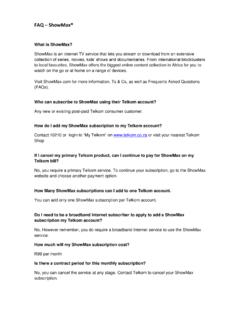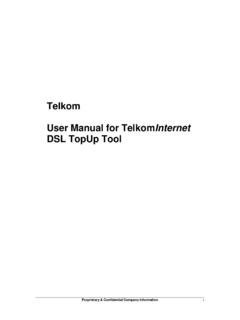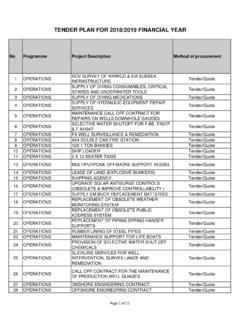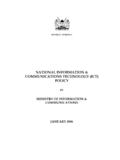Transcription of Overview of electronic communications regulation in South ...
1 1 Overview of electronic communications regulation in South Africa 2 Content Introduction .. 3 Legislative Framework in South Africa .. 4 Role-players .. 5 Department of communications .. 5 Independent communications Authority of South Africa .. 5 Universal Service and Access Agency of South Africa .. 5 Portfolio Committee on communications .. 5 Competition Authorities .. 6 State-owned Enterprises .. 6 National Consumer Commission .. 6 Policy environment .. 6 National Broadband Policy .. 7 National Radio Frequency Spectrum Policy.
2 7 electronic communications Licensing .. 7 Service licensing framework in South Africa .. 7 Licence exemptions .. 9 Control and ownership of licences .. 10 Infrastructure rights .. 10 11 Local Loop Unbundling (LLU) .. 11 Carrier Select and Carrier Preselect .. 11 Consumer Protection .. 12 Code of Conduct regulations .. 12 End-user and Subscriber Service Charter regulations .. 12 Code of Conduct for People with Disabilities .. 12 Price controls .. 12 Radio Frequency Spectrum .. 12 Allocation vs. Assignment .. 13 Licence-exempt frequency.
3 13 Spectrum licence fees .. 14 Spectrum trading .. 14 Numbering .. 14 Number portability .. 14 Films and Publications .. 14 Registration .. 14 Child pornography and the child pornography hotline .. 15 Interception and Monitoring .. 15 Customer registration .. 15 Assisting with investigations .. 15 Intermediary liability .. 16 3 Introduction electronic communications regulation is a vastly complex area of expertise and is most properly left to those who have adopted it as a speciality. Nevertheless a working knowledge of regulatory issues is critical for managers in telecommunications companies and customers of such companies.
4 In particular, awareness of consumer rights or obligations and an understanding of the regulatory framework for interconnection and facilities leasing will be critical in negotiating agreements and service levels for the provision of electronic communications services. This Overview is intended as a basic primer in South African law and regulation relating to electronic communications and it is hoped it will empower licensees and potential licensees to appreciate the legal and regulatory environment. It is, of course, not intended to be exhaustive, nor should it be relied upon without further specific consultation.
5 This Overview does not cover broadcasting-specific licensing or regulation . Please address any queries or suggestions in respect of this Overview to _____ 4 Legislative Framework in South Africa The primary Act of Parliament regulating the electronic communications industry in South Africa is the electronic communications Act 36 of 2005 ( the ECA ). The ECA can be characterised as pro-competitive legislation in stark contrast to the preceding Telecommunications Act, which was protectionist in that it sought to protect the incumbent fixed line provider, Telkom SA Ltd, from the effects of competition.
6 The ECA covers a wide range of issues, including: licensing, access, infrastructure rights such as way-leaves, the management and assignment of frequency markets and competition, and universal service. The ECA is convergence legislation which attempts to take into account the blurring between broadcasting and telecommunications in particular. It is anticipated that wide-ranging amendments to the ECA will be tabled in 2012. Other legislation which impacts upon the sector includes ( this is a non-exhaustive list): the ICASA Act 13 of 2000 ( the ICASA Act ) which established the communications sector regulator the Independent communications Authority of South Africa ( ICASA ) and sets out its powers as well as sanctions which can be imposed on licensees for non-compliance with their licence terms and conditions.
7 The regulation of Interception of communications and Provision of communication -related Information Act 70 of 2002 ( RICA ) which sets out a lawful intercept regime and details the obligations of electronic communications service providers in co-operating with law enforcement authorities and storage of traffic data; the electronic communications and Transactions Act 25 of 2002 ( the ECT Act ) which creates legal exemptions for information intermediaries where they act as such ( as a mere conduit or hosting provider); the Competition Act 89 of 1998 ( the Competition Act ) which legislates against anti-competitive practices such as collusion and cartels; the Film and Publications Act 65 of 1996 ( the Film and Publications Act ) which requires ISPs and others to register and sets out obligations around child sexual abuse images and exposure of children to pornography.
8 5 the Protection from Harassment Act 17 of 2011 ( the Harassment Act ) which obliges electronic communications service providers to assist where a person alleges harassment by means of electronic communications . The Protection of Personal Information Bill 9 of 2009 was introduced to the South African Parliament in 2009 and is intended to comprehensively regulate the use and management of personal information within the digital environment. It is unlikely to be finalised during 2012. _____ Role-players Department of communications The Department of communications (DoC) is responsible for setting electronic communications policy, overseeing radio frequency spectrum and representing South Africa in international fora such as the International Telecommunications Union (ITU).
9 Independent communications Authority of South Africa The Independent communications Authority of South Africa (ICASA) is the independent communications regulator, set up and governed by the ICASA Act. The establishment of an independent regulator is a consequence of South Africa s membership of the World Trade Organisation (WTO) and its accession to the Reference Paper to the Fourth Protocol on Basic Telecommunications which sets out requirements for signatories regulatory environments. Universal Service and Access Agency of South Africa The Universal Service and Access Agency of South Africa (USAASA) was established under the ECA to promote the goals of universal access and universal service in the under-serviced areas of South Africa.
10 Licensees are required to contribute to the Universal Service and Access Fund (USAF) which is intended for use in incentivising and subsidising the roll-out of electronic communications networks in under-serviced areas. Portfolio Committee on communications The Parliamentary Portfolio Committee on communications (PPCC) exercises oversight over the above three entities. It has powers to conduct inquiries and subpoena documents. 6 Competition Authorities ICASA is generally regarded as having ex ante regulatory powers, it acts so as to prevent future anti-competitive conduct.






